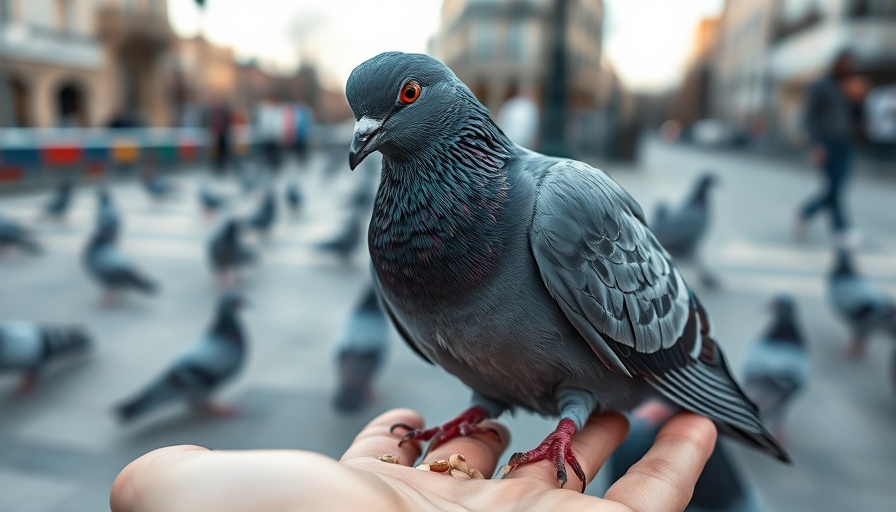
Why Pigeon Feeding Is Essential for Urban Wildlife
Pigeons have a historical bond with urban environments, often seen flitting about city streets and parks. As city-dwelling birds, they play a critical role in maintaining ecological balance. By feeding them properly, we foster a connection with nature and promote biodiversity. This is especially significant in bustling urban areas where natural habitats are increasingly threatened.
Understanding the Pigeon Diet: More Than Just Seeds
Pigeons are granivores, feeding predominantly on grains and seeds, mirroring their natural diet in the wild that includes sunflower seeds, corn, and wheat. To nourish these feathered friends effectively, it's vital to recognize that their dietary needs go beyond mere sustenance; they also require variety to thrive. Providing a mixture of quality grains can significantly enhance their health, making them more resilient to urban challenges.
Choosing the Right Food: Essential Guidance for Newcomers
The market offers a plethora of bird feed mixes, but not all are created equal. It's essential to select high-quality feed specifically formulated for pigeons. This could include pre-packaged wild bird seed mixes that contain a blend of nutritious ingredients tailored for their needs. Additionally, avoid common household food such as bread crusts or salty snacks, as these can harm their health. For those wanting to venture further into sustainable practices, consider sourcing food from local, organic suppliers.
The Importance of Fresh Water: Hydration for Health
Water is just as crucial as food for the well-being of pigeons. Always provide fresh water in shallow dishes, easily accessible near their feeding locations. Clean and refill the dishes regularly to prevent contamination and ensure they remain hydrated. This routine can significantly influence their health and energy levels, making it a vital part of your feeding regimen.
Setting Up Feeding Stations: Creating a Safe Space
To attract pigeons while ensuring their safety, setting up designated feeding stations can make a real difference. Choose open, tranquil areas away from high-traffic zones, allowing pigeons to dine without stress. The placement will not only encourage their return but can also foster a sense of community among bird enthusiasts who might share feeding responsibilities.
Establishing a Consistent Feeding Schedule: Building Trust
Like many creatures, pigeons thrive on routine. Establishing a consistent feeding schedule can build trust and encourage them to visit your feeding stations regularly. Aim to feed at the same times each day, creating a tangible connection between you and these urban birds.
Avoiding Overfeeding: The Balance is Key
While feeding pigeons can be rewarding, it is imperative to strike a balance between adequate nourishment and overfeeding. Offering too much food can lead to health issues, such as obesity, and contribute to increasing pigeon populations in urban settings. Aim to provide food amounts that they can consume promptly, thus reducing waste and attracting unwanted pests.
Monitoring Food Supply: Keeping an Eye for Continuity
Monitoring the food supply in your feeding stations is key to ensuring that pigeons have a continuous source of nourishment. This is particularly important during harsh weather when food scarcity can become a real concern for wildlife. Adjustments may be necessary to meet their needs as conditions change.
Respecting Wildlife Guidelines: A Responsible Approach
Before embarking on your feeding endeavors, it is crucial to familiarize yourself with local wildlife regulations, as some regions may impose restrictions on feeding. Understanding these guidelines will ensure you're supporting the health of the pigeons without inadvertently causing harm to local environments.
Concluding Thoughts: Connecting with Nature
Feeding pigeons presents a fantastic opportunity to connect with our natural surroundings while promoting the well-being of these birds. With thoughtful practices—selecting the right food, establishing feeding stations, and adhering to local guidelines—we can create a positive impact on urban wildlife that enriches both our lives and pigeon populations.
 Add Row
Add Row  Add
Add 




 Add Row
Add Row  Add
Add 

Write A Comment